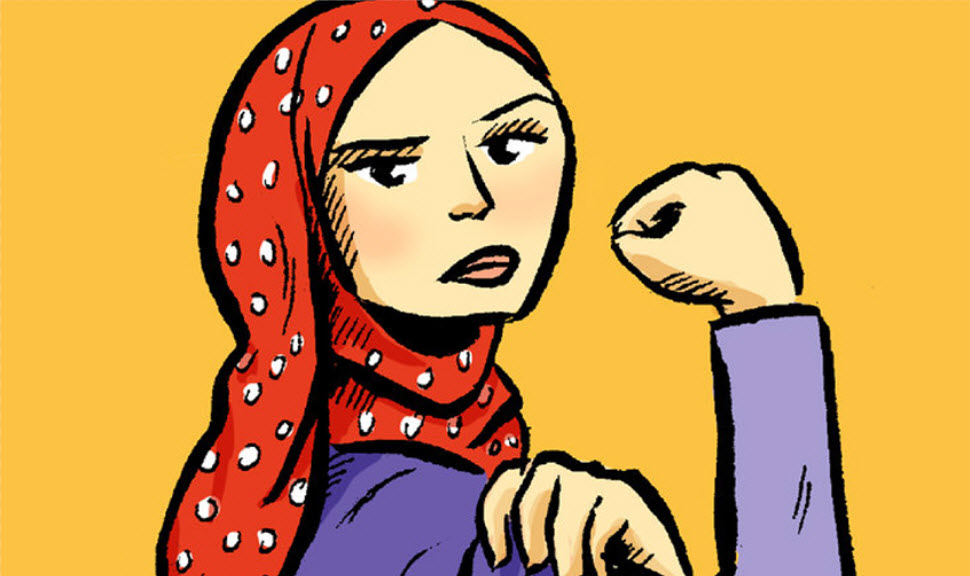IF YOU TRY TO TRACE the debate between feminist leaders and prominent religious speakers, you’ll probably come away from your research thinking, “There’s no way in hell these people are compatible.” The old men who make up the religious speaker pool are quick to blame feminism and its adherents for everything from natural disasters to erectile dysfunction. Feminists, meanwhile, call out hypocrisy and dangerous doctrines, from Pat Robertson’s slave-labor gem mines to purity culture.
Truth be told, religion and feminism have a spotty relationship history. Proto-feminist abolitionists in the early 19th century were the subject of many ministers’ scorn, as were their suffragette sisters nearly a century later. Prior to Roe v. Wade, religious leaders worked with feminist organizations to help women obtain safe abortions.
But in 1979, six years after Roe, the foundation of the Moral Majority appeared to have buried any hopes for a resolution between faith and feminism. Though the organization foundered in the 1980s, it laid the foundation for the Religious Right to steer political and religious conversations.
This, of course, gave us some fantastic sound bites. In 1992, televangelist Pat Robertson referred to feminism as “a socialist, anti-family, political movement that encourages women to leave their husbands, kill their children, practice witchcraft, destroy capitalism and become lesbians.” Really? He expects me to accomplish all that? I barely have time to write, read, and shower on a regular basis, so I must be slacking off on my feminist duties.
Putting the prominent voices aside, you’ll find that individuals in faith and feminist communities have a much more nuanced approach to the conflict. Most people in the U.S. are far more accommodating and open-minded than social media comments would suggest, and feminists who belong to faith traditions are no different. The highly-publicized conflict between faith and feminism, however, leads outsiders to ask the feminists who continue to adhere to their religions: Why?
That’s the question contributors to Faithfully Feminist — a new book from the interfaith organization of the same name — are answering today. In this collection of essays, fifteen women from each Abrahamic tradition reject the notion that feminism and religion are incompatible. The 45 contributors explain why they remain in their faith communities and how they reconcile the versions of feminism they espouse with religious teachings that may be outright anti-woman. Given the tradition of rejecting vocal religious feminists, these women are bravely honest.
Third-wave feminists have taken religious organizations to task for their opposition to women’s healthcare, promotion of abstinence-only sex-ed curricula, and distribution of harmful myths about modesty, purity, and consent. Intersectional feminists, largely, realize that rejection of the burqa and niqaab as oppressive stems from both Islamophobia and the idea that women — particularly women of color — are docile bodies who are unable to oppose the sanctions placed on them. However, there are still self-identified feminists who believe that anything promoted to protect women’s modesty and purity is part of rape culture; they aren’t wrong, but they aren’t right, either.
Most appeals to women’s modesty promote the idea that women can avoid sexual assault and harassment by dressing in ways that will not arouse men. Unfortunately, this kind of thinking ultimately leads to the idea that women who do not dress modestly are responsible for any violence and threatening comments their receive. The problem with this line of thinking, aside from its victim-blaming and slut-shaming, is that rape happens everywhere: to women in bikinis and burqas alike. For the most part, this is the fallacy feminists oppose.
Make no mistake: we should be critical of all culture. However, the lens often unfairly focuses on Muslim women, perpetuating the idea that women who wear hijabs, chadors, burqas, and niqaabs are oppressed. To say that wearing traditional garments evidences some internalized patriarchal system robs women of any perception of agency. What’s more, it ignores history.
Do you know what happened in 1936, when the Shah of Iran, Reza Shah Pahlavi, banned veiling in Iran? They protested. And what happened in 1979, when Ayatollah Khomeini made veiling mandatory? The women protested again. The same thing happened in France, where veiling was banned by law in 2010. On the first day of the ban, Muslim women took to the streets, wearing the veil in protest. Clearly, Muslim women feel that veiling is their choice, and that choosing to cover up is between a woman and her God, and no one else.
Feminism is about giving women choices. Although the main choices we discuss involve work and family life, the decision of whether or not to wear the veil is a personal one, and should be treated as such. Veil bans and compulsory bailing are two halves of the same oppression: that which denies women a choice. When we criticize all veiling as a symptom of oppression, we assume that the women involved are incapable of deciding for themselves. And that most certainly is not feminist.

















